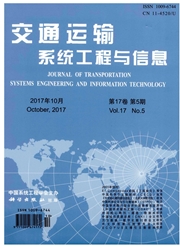

 中文摘要:
中文摘要:
实际道路系统中,交通个体的日常出行决策是一个长期的演化过程,出行者根据出行经验和获取的路径信息确定行驶路线.考虑有装置和无装置两类用户,在时间反馈策略和平均速度反馈策略下对出行者的出行效率进行了讨论分析.仿真结果表明,出行者对历史经验的依赖程度决定系统的演化效率.两类出行者的出行效率均随出行需求增加而减小,随历史经验依赖性增加而先增加然后趋于稳定,并且随市场渗透率的增加,在不同信息策略下表现出相反的趋势.一般来说,有装置出行者具有较少的行驶时间,且在速度反馈策略下效果明显,两类用户的出行效率差距随着时间的演化有减小的趋势.
 英文摘要:
英文摘要:
In reality, the individual's day-to-day route choice behavior is a long-time evolution process, and travelers choose their traveling routes according to the combination of historical experience and real-time traffic in- formation. Considering two classes of users, one equipped with advanced traveler information systems (ATIS) and the other without, this paper investigates the travel efficiency under two different information feedback strategies, namely, travel time feedback strategy and mean velocity feedback strategy. The simulation results given by the cel- lular automaton model show that the more users rely on historical experience, the quicker the system evolves to the equilibrium. To all users, the travel efficiency decreases with travel demand and firstly increases then decreases with the dependent degree to historical experience. However, as far as the ATIS market penetration rate is con- cerned, the users' travel efficiency under two feedback strategies exhibits different trends. The equipped travelers have shorter travel time, particularly under mean velocity feedback strategy. In addition, the difference of travel effieieneies between two classes of users decreases as days evolve.
 同期刊论文项目
同期刊论文项目
 同项目期刊论文
同项目期刊论文
 Equity and efficiency analysis of pricing strategies in a bi-modal network with heterogeneous user g
Equity and efficiency analysis of pricing strategies in a bi-modal network with heterogeneous user g Modeling the evolutions of day-to-day route choice and year-to-year ATIS adoption with stochastic us
Modeling the evolutions of day-to-day route choice and year-to-year ATIS adoption with stochastic us Modeling time-dependent travel choice problems in road networks with multiple user classes and multi
Modeling time-dependent travel choice problems in road networks with multiple user classes and multi One-step solution fabrication of magnetic chains consisting of jingle-bell-shaped cobalt mesospheres
One-step solution fabrication of magnetic chains consisting of jingle-bell-shaped cobalt mesospheres Support vector machine forecasting method improved by chaotic particle swarm optimization and its ap
Support vector machine forecasting method improved by chaotic particle swarm optimization and its ap Static floor field and exit choice for pedestrian evacuation in rooms with internal obstacles and mu
Static floor field and exit choice for pedestrian evacuation in rooms with internal obstacles and mu A model for evaluation of transport policies in multimodal n etworks with r oad and p arking capacit
A model for evaluation of transport policies in multimodal n etworks with r oad and p arking capacit 期刊信息
期刊信息
